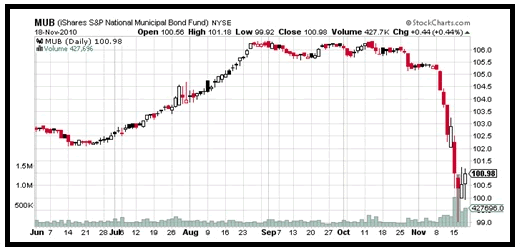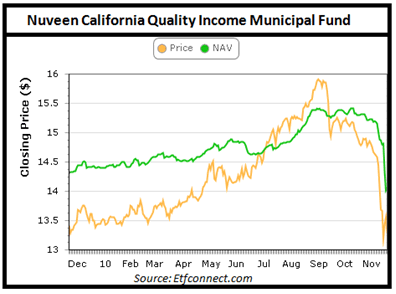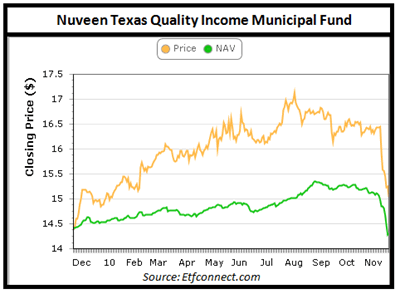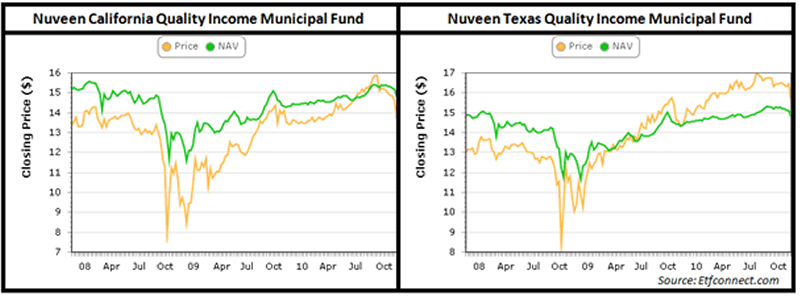Muni Bond Crisis, The One Thing You Must Know
Interest-Rates / US Bonds Nov 23, 2010 - 12:29 PM GMTBy: Q1_Publishing
 It’s a scary time for seemingly safe municipal bonds.
The Boston Globe warns muni bonds “have been sinking like a rock” and the fall “signals turmoil ahead.” The New York Times suggests it is “akin to the one that brought Greece to its knees.” Time magazine warns they’re the “next financial land mine.” The mainstream media is all over the emerging muni bond crisis.
It’s a scary time for seemingly safe municipal bonds.
The Boston Globe warns muni bonds “have been sinking like a rock” and the fall “signals turmoil ahead.” The New York Times suggests it is “akin to the one that brought Greece to its knees.” Time magazine warns they’re the “next financial land mine.” The mainstream media is all over the emerging muni bond crisis.
There is, however, a lot more to the story than they’re letting on. And knowing the most important elements of this unfolding crisis will allow you to avoid the pitfalls and position yourself to personally capitalize on it all.
The last time a window of opportunity opened in muni bonds, investors walked away with 100% gains (yes, from muni bonds) in a very short time. Now, we’re on the verge of it happening again. Here’s the set up.
It Doesn’t Matter Until it Matters
Muni bonds are hardly ever talked about. They’re the classic “widows and orphans” investment. They’re issued by states, schools, and other municipalities which have historically rarely defaulted. They pay a steady rate of interest. The interest is usually tax free.
That all changed this week.
In classic it doesn’t matter until it matters groupthink, investors woke up to the disastrous financial quagmires governments at all levels have gotten themselves into. And they ran for the exits.
Municipal bond investors yanked $3 billion out of muni bond funds last week. That was the biggest sell-off since 1992.
The relatively slight selling pressure on the highly illiquid $2.8 trillion muni bond market had a big impact too.
The iShares S&P National Municipal Bond ETF (NYSE:MUB) plummeted:

The downward move brought a lot of attention to muni bonds. And rightly so.
More than a year of gains in muni bonds was wiped away in a matter of days.
More importantly, the sell off actually increases the risks to muni bonds. Continued weakness could spark a very real and painful downward spiral for muni bond issuers. As the bonds decline in value interest rates go higher. Higher rates make borrowing more expensive. The increased costs exacerbate muni bond issuers’ already large deficits. That, in turn, causes investors to sell more, push rates higher as they demand more return for the risk, and on and on.
Many major media outlets are touting the sell-off as a foreshadowing of a massive crisis that will affect muni bond issuers nationwide.
But they’re missing one big point. Governments of all levels are reaching their borrowing capacity. Not all of them, however, are on equal footing.
As usual, that critical factor is the key to finding opportunity in this growing mess.
Voting with Their Feet
The Washington Examiner highlights in Low Tax States Gain Seats, High Tax Will Lose Them how and why it’s happening:
Migration from high-tax states to states with lower taxes and less government spending will dramatically alter the composition of future Congresses, according to a study by Americans for Tax Reform (ATR).
Eight states are projected to gain at least one congressional seat under reapportionment following the 2010 Census: Texas (four seats), Florida (two seats), Arizona, Georgia, Nevada, South Carolina, Utah and Washington (one seat each). Their average top state personal income tax rate: 2.8 percent.
By contrast, New York and Ohio are likely to lose two seats each, while Illinois, Iowa, Louisiana, Massachusetts, Michigan, Missouri, New Jersey, and Pennsylvania will be down one apiece. The average top state personal income tax rate in these loser states: 6.05 percent.
The state and local tax burden is nearly a third lower in states with growing populations, ATR found. As a result, per capita government spending is also lower: $4,008 for states gaining congressional seats, $5,117 for states losing them.
And, as ATR notes, “in eight of ten losers, workers can be forced to join a union as a condition of employment. In 7 of the 8 gainers, workers are given a choice whether to join or contribute financially to a union.”
The research shows that over the last decade between censuses people have voted with their feet. They’re leaving high-tax, union friendly areas for low-tax, business-friendly areas.
This highlights how low-tax areas are attracting more taxpayers and high-tax areas are driving them away.
From there the opportunities become apparent.
Reality vs. the Market
There’s already a big divergence between the creditworthiness of muni bond issuers as taxpayers vote with their feet. Consider the divergence between two of the biggest muni bond issuing areas in the county.
At one end of the muni bond spectrum is California. The poster child for government fiscal mismanagement has recently announced one of the largest muni bond offerings in history to fund a big (and widening) budgetary chasm.
The fiscal peril face by California at all levels of government shows up in the confidence investors have in Nuveen California Quality Muni CEF (NYSE:NUC):

Remember, closed end fund (CEF) trade at a discount or premium to their net asset value (NAV) based on investor sentiment and demand. So the chart above reveals investors are demand a lot of extra return to lend to California governments.
The NAV has fallen sharply, but the price investors are willing to pay for it has fallen much faster.
Muni bond investors are basically demanding a 16.75% tax-equivalent return (11.25% tax-equivalent yield for the fund plus the discount) to lend to California and its municipalities.
That’s a huge yield on par with Greece and Ireland. And demonstrates how tough it will be for California governments to make ever-growing interest payments on newly issued debt as it continues down the downward spiral.
Texas is on the other end of the muni market spectrum. Granted, Texas has not been immune to deficits. But its deficit is smaller and its politicians have proven committed to close the deficit without raising taxes significantly and driving away taxpaying residents and businesses ($80 per barrel oil helps out too).
The chart below of the Nuveen Texas Quality Income CEF (NYSE:NTX) shows investors consider Texas much more creditworthy than California:

Texas muni bonds haven’t been immune to the sell-off either, but the premium of the fund’s price over NAV is a strong sign of confidence. The premium to NAV of 5.5% shows that investors are willing to lend to Texas for a mere 3.3% tax-equivalent return (8.8% current tax-equivalent yield for the fund minus the premium).
The difference between 3% and 16.75% will have a massive impact on the future of these states’ and their municipalities’ budgets. They’re all in debt, but the cost of making interest payments will be significantly lower in states like Texas compared to California.
These are the differences to pay attention to as the muni bond crisis plays out in the months and years ahead.
History Repeats
Markets rarely act rationally in the short-term. They’re driven by euphoric highs and panic lows. The muni bond market is no different.
The charts below of the Nuveen Texas Quality Income CEF and the Nuveen California Quality Muni CEF over the last three years demonstrate this point:

The trading activity of both funds during the credit crunch was nearly indistinguishable. Both of them sold off drastically. Both hit extreme lows. Their discounts to NAV reached more than 25%. They’ve both returned more than 100% since then.
If the markets really are facing a muni bond crisis where states and municipalities can’t borrow regardless of their creditworthiness like what happened in 2008, the markets won’t distinguish between the good and the bad. They’ll all just sell off like in late 2008. That will be the time for the prudent investor to seize the opportunity in the debt issued by more fiscally sound municipalities that have at least a plan or some hope of making good on their debts.
Right now the crisis is in the early stages. But if the Boston Globe, New York Times, and Time magazine are touting the risks, we know the herd is watching the situation.
If history is any example, they won’t hesitate to sell completely and indiscriminately in the event of further weakness and at the worst possible time.
In the end, this all just illustrates how disciplined investors can prepare themselves to find opportunities in many market conditions. Although at the Prosperity Dispatch we’ve long considered lending to governments with no plan or commitment to paying off their growing debts to be a very poor long-term investmestment, in this case, a sweeping crisis could create another great buying opportunity and a shot at relatively safe 100% gains if it gets bad enough.
Good investing,
Andrew Mickey
Chief Investment Strategist, Q1 Publishing
Disclosure: Author currently holds a long position in Silvercorp Metals (SVM), physical silver, and no position in any of the other companies mentioned.
Q1 Publishing is committed to providing investors with well-researched, level-headed, no-nonsense, analysis and investment advice that will allow you to secure enduring wealth and independence.
© 2010 Copyright Q1 Publishing - All Rights Reserved
Disclaimer: The above is a matter of opinion provided for general information purposes only and is not intended as investment advice. Information and analysis above are derived from sources and utilising methods believed to be reliable, but we cannot accept responsibility for any losses you may incur as a result of this analysis. Individuals should consult with their personal financial advisors.
© 2005-2022 http://www.MarketOracle.co.uk - The Market Oracle is a FREE Daily Financial Markets Analysis & Forecasting online publication.



